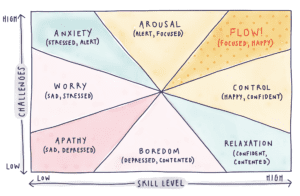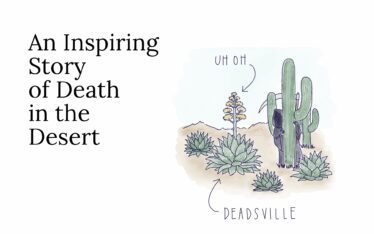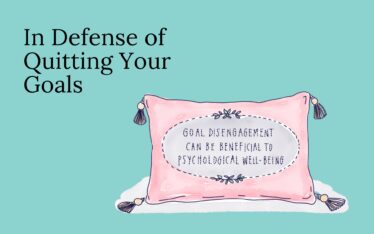Don’t you just love a chart that explains your feelings to you, in a way that feels more legit than reading your astrological chart? Like this one, that’s backed by real and actual science?

If you’re feeling anxious, for example, it just might be because you’re overly challenged and woefully short on the skills to meet the task at hand. Being thrown into the deep end of the pool with zilcho training — like in a “sink or swim” work culture — feels like the top left corner of this chart. (It also feels like shit and the need for Xanax, but I didn’t have enough room to write all those words in the little triangle.)
If you’re feeling bored, for example, you might not be faced with any kind of challenge at all — even if you’ve got the skills to crush the job at hand. When there’s no job to crush most of us don’t do so well, do we? As you can see in the bottom middle of the chart, it might feel like contentment at first (like if we’re cooling off from a flaming phase of burnout), but it gets boring in a hurry and most of us Type-A-ers want to GET ON WITH A GOOD OLD-FASHIONED ENDEAVOR ALREADY.
So what’s with the yellow polka-dot section of the chart?
Yes, friends, that’s where we want to be.
Those of us who effectively balance the see-saw of challenge and skill get swept up in that optimal experience known as flow — the immersed psychological state associated with highly engaging activities. (RIP, Mihaly Csikszentmihalyi, the psychologist who recognized and wrote the book on this liquid-gold-of-positive-psychology concept.) We know we’re in a state of flow when we feel swept up in the thing we’re doing… when we’re “in the zone” and we lose track of time… when we’re anything but bored or tired when doing it… when we participate in the activity out of sheer and utter enjoyment (and not just because your boss or Mother made you do it).
I’ve written about flow before (here) and I’m not going to say what I said then all over again. This time I have three questions for you to reflect on and answer. Ready?
Question #1: What activities get you into the revered state of flow?
- Most people feel flow-ey when they’re challenged with a task that nudges them to the outer limits of their skill level. Picture your comfort zone like a bubble around you, with your right foot sticking just outside the bubble, toes wiggling in the wind. You know your foot won’t get lopped off (so you’re safe). Doesn’t it feel a little bit thrilling to be stepping into new territory, ready to try and learn and accomplish and feel fully engaged? Where can you push up to the edge of your comfort zone? What activities in and out of work get you feeling fully committed and alive?
Question #2: When was the last time you felt flow?
- We like the idea of getting into flow during our precious leisure time, but Csikszentmihalyi points this uncomfortable point out about how we tend to squander our free time: “Although, as we have seen, people generally long to leave their places of work and get home, ready to put their hard-earned free time to use, all too often they have no idea what to do there. Ironically, jobs are actually easier to enjoy than free time, because like flow activities they have built-in goals, feedback, rules, and challenges, all of which encourage one to become involved in one’s work, to concentrate and lose oneself in it. Free time, on the other hand, is unstructured, and requires much greater effort to be shaped into something that can be enjoyed.” This troubles me because I have been known to squander many an evening and weekend (i.e.: passively watching Inventing Anna). Does this trouble you, too? How can you set goals and build a little more structure around your activities, to let flow… flow?
Question #3: How do you know you’re in a state of flow? What does it feel like?
- Most people experience a sense of immersion when in flow — they’re totally focused on the canvas they are painting/ the rock-climbing route they are struggling to reach the top of/ the spreadsheet they are creating. This concentration allows them to be fully present and dismiss other distractions.
- Many people report feeling an unstoppable sense of control, as though achievement is inevitable.
- A loss of self-consciousness is also a key characteristic of flow; our ego gets to go on a little holiday when we let ourselves get swept up in the enrapturing task at hand.
- Get in touch with what flow feels like to you, and seek to recreate that feeling as often as possible. Really notice how you feel when you’re getting carried away by the experience of the moment. It feels undeniably lively, doesn’t it?
A too-easy life feels like a snorefest. A too-tough life feels like a giant uphill battle that always ends in failure. But the zone that exists between challenge and skill, with the right goals and feedback along the way… well that’s one of the pathways to subjective well-being and motivation. I’m going to go work on some kind of art thing, which always sweeps me up into the current of flow. What will you do to get swept away?







